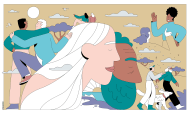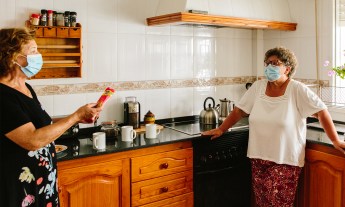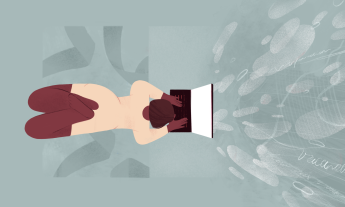
Trying to stay on top of COVID news is like trying to drink from a fire hose. Yet right now it feels like we have no choice but to do that so we can best protect ourselves and our loved ones. It’s stressful and draining.
TED asked Alanna Shaikh, a global public health expert and a TED Fellow, for tips on how to navigate this information overload while staying safe and sane. The following advice was edited from conversations with Shaikh.
1. Look for news that you can act on
When you’re trying to figure out what stories to stay on top of, ask yourself: “Will having this information benefit my life or my work? Will it allow me to make better-informed decisions?”
Accumulating masses of information that you can’t use isn’t so helpful. For most people, there’s not a lot of value to tracking COVID-19 news in depth. For example, do you really need to follow the progress of individual vaccine candidates? While staying abreast of projected vaccines could offer you a sense of hope, the details may not be so important.
For most people, the most critical information for you to follow is how the virus is transmitted. Scientists are still learning every day about how people get infected. For instance, some credible data is now pointing to airborne transmission and not to surface transmission. This means we can most likely stop sanitizing our groceries. Instead, according to the latest findings, we should be extremely cautious about spending significant periods of time in indoor spaces with recycled air.
Another thing that scientists know now — that they didn’t know in January — is that people can transmit the virus even without showing any symptoms. That’s why you should wear a mask in public, just in case you’re one of those asymptomatic carriers. This is the kind of actionable information that’s worth staying on top of.
2. Turn to trusted sources
You can generally trust the accuracy of top news sources like Nature, Wired and The New York Times — to name three examples. Nature is a scientific journal that publishes peer-reviewed research, and both Wired and the New York Times have the kind of budget that lets them hire full-time journalists who will stand by the facts or who rely on fact-checkers to verify their information.
That being said, COVID-19 has been heavily politicized. Some major news sources are basing their content more on opinion than on science. On top of that, media organizations and publications — non-academic and academic — are under tremendous pressure. Reporters at major outlets can misunderstand newly released results, and poor-quality research can sometimes slide through the peer-review process at the best journals. Also, the research being covered could be extremely preliminary. When a study is mentioned, take note of what stage it’s in and adjust your expectations accordingly.
Resist reading pieces written by self-proclaimed data nerds or armchair analysts. If you’re looking for scientifically supported facts, these kinds of analyses usually get things wrong 9 times out of 10. Is that 1 time they’re right worth the effort it will take you to verify it? I doubt it.
On the other hand, I do make a point of reading people-focused stories about COVID — stories about health care providers, people who’ve survived being sick, or people who are just surviving this pandemic. It makes me feel connected to all of the people in the world who, like me, are doing their best to get through this disaster.
3. Check where their information is coming from
You’ve clicked on a story about a promising new development to contain COVID. But before you get too excited, find out: Where did they get their information? An article that relies upon data which was published in a peer-reviewed journal is more reliable than one that relies upon an interview with a physician or some other anecdotal source.
Here’s a red flag: If you see that an article consistently focuses on either the happiest, most positive estimates or the darkest, scariest estimates, don’t trust it. In general, when a journalist shares an estimate, they should explain where that number came from and how it was calculated. Then look up their source.
Be wary of articles or sources that claim to have a definite answer to a complex question. For example, Dr. Anthony Fauci is currently saying that there should be a vaccine for COVID-19 in early 2021; the Gates Foundation has a longer estimate; and others are warning that we may never have a vaccine for it. Right now, there is no consensus about a timeline — these people and organizations are simply offering their best guesses. While their guesses are backed by information, they’re still guesses.
4. Look for news that works for you
Because I work in global health, I have a pretty deep network on Twitter of global health people that I’ve come to know and whose judgment I value. I use them as my first scan for research and articles that I trust. This works for me because they belong to my professional community, but their writing is not geared towards the general public.
For people whose expertise lies outside global health — i.e., everyone else — you’ll want to find sources of information that you can read and digest without having to devote your whole day (or brain) to it. I like the Think Global Health website; it’s aimed at passionate non-experts. It’s not dumbed down, but it doesn’t assume you have a PhD. Johns Hopkins University is publishing some great work on COVID — it’s on the technical side but it’s not so technical that you need to be an academic to read it. So is Vox; they have some terrific explainers.
Lastly, keep an eye on the information shared by your local health department; its reliability will vary depending on where you are. In some places, local health departments are limited by small budgets, staff or other factors, but others may have the best information about current guidelines for your area and when and how you can get tested for COVID-19. Take a look, and see what yours is offering.
5. Be prepared to change your behavior based on new information
No matter how trustworthy a source is, it’s important to remember that the entire body of research around this virus is less than a year old. Let me say that again: The research is less than one year old.
There are very few hard facts in this situation, which is one of the reasons why this pandemic is so frustrating and confusing. We’re learning new things all the time, and sometimes they contradict the old stuff. For example, in a TED Talk that I gave in March, I spoke about sanitizing surfaces and avoiding wearing a mask unless you’re sick. Since then, the thinking on those has shifted — sanitizing, while still recommended, is not as vital as we thought, and all of us should wear masks in public (see more in tip #1).
At the same time, the speed and urgency of scientific research can result in sloppiness. For instance, in June there was a high-profile retraction in The Lancet. This prominent medical journal published a study that supported the use of the drug hydroxychloroquine for COVID-19, but the editors came to realize that this was based on unreliable data. The upshot is, even trusted sources aren’t perfect. We live in an uncertain world run by flawed human beings.
But just because no source is perfect doesn’t mean you should disbelieve all sources. Instead, look for consensus among your trusted sources. Right now, for example, reputable organizations and scientists basically agree on masks, contact tracing and the existence of transmission of COVID by people who aren’t showing symptoms.
6. Refrain from arguing with people who ignore the facts
We all have a limited amount of juice to cope with the multiple crises going on around us. Instead of getting into debates with people about social distancing and masks, try to redirect your energy into more constructive activities like voting the right politicians into office in your community and country and in supporting local services that will help those in need.
I know that it’s incredibly difficult and frustrating when you see people around you making choices that are unsafe not only for them but for you and your community. If you think you could possibly change their behavior, you might say something, especially if you know them. Reasonable people who care about you may be willing to have an open discussion with you. But if you don’t know them or know that they won’t change, it’s probably best to back off. Expressing your rage isn’t healthy for you — and it might cause them to cling to their beliefs more tightly.
Like it or not, this situation isn’t going anywhere. This pandemic is awful and complicated, and finding our way through it won’t be smooth, easy or emotionally comfortable. It’s a constant, dynamic process of learning new things and adapting as we learn.
Watch her TED Talk here:



















